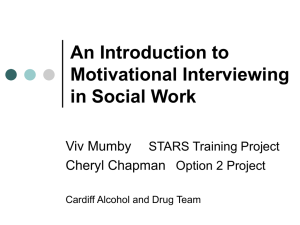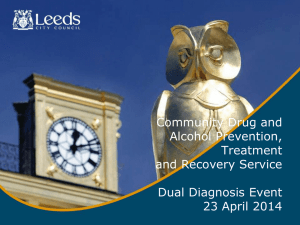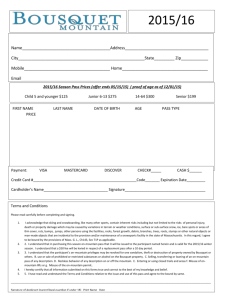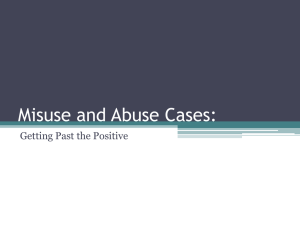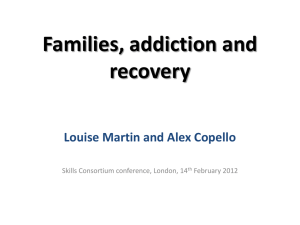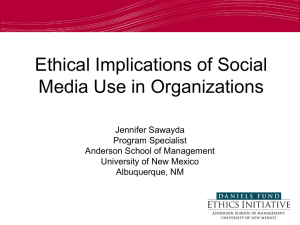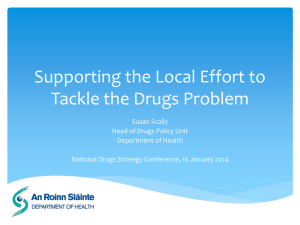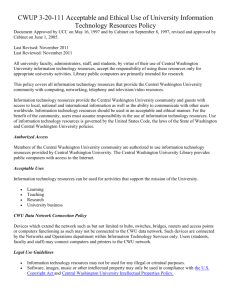Carry out comprehensive substance misuse assessment
advertisement
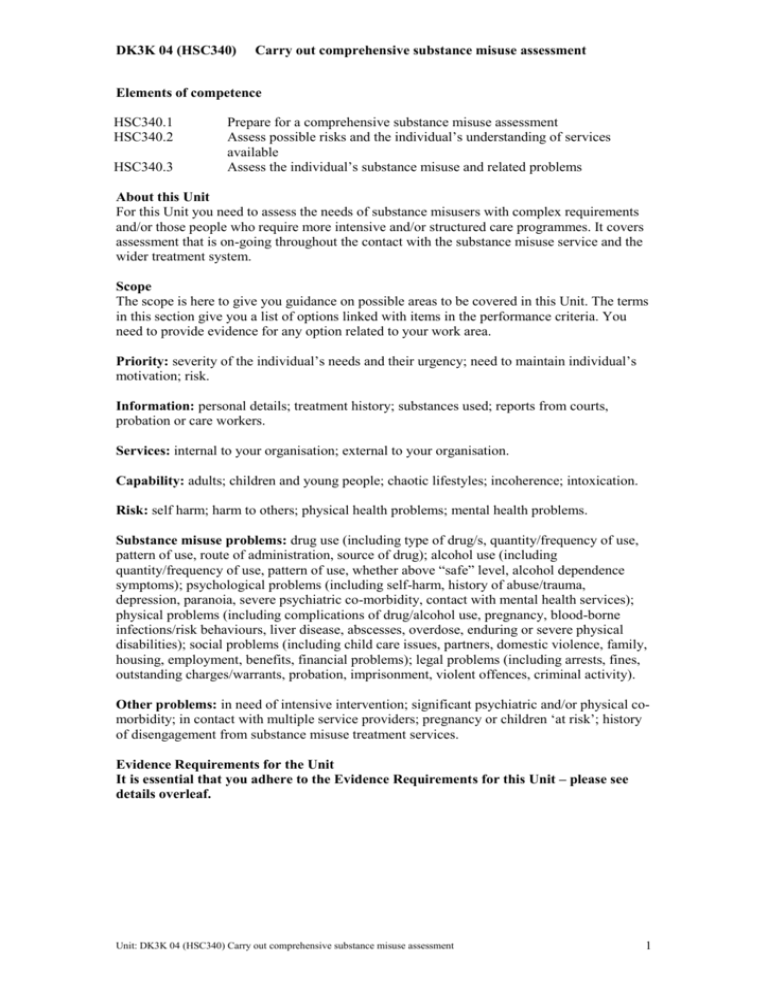
DK3K 04 (HSC340) Carry out comprehensive substance misuse assessment Elements of competence HSC340.1 HSC340.2 HSC340.3 Prepare for a comprehensive substance misuse assessment Assess possible risks and the individual’s understanding of services available Assess the individual’s substance misuse and related problems About this Unit For this Unit you need to assess the needs of substance misusers with complex requirements and/or those people who require more intensive and/or structured care programmes. It covers assessment that is on-going throughout the contact with the substance misuse service and the wider treatment system. Scope The scope is here to give you guidance on possible areas to be covered in this Unit. The terms in this section give you a list of options linked with items in the performance criteria. You need to provide evidence for any option related to your work area. Priority: severity of the individual’s needs and their urgency; need to maintain individual’s motivation; risk. Information: personal details; treatment history; substances used; reports from courts, probation or care workers. Services: internal to your organisation; external to your organisation. Capability: adults; children and young people; chaotic lifestyles; incoherence; intoxication. Risk: self harm; harm to others; physical health problems; mental health problems. Substance misuse problems: drug use (including type of drug/s, quantity/frequency of use, pattern of use, route of administration, source of drug); alcohol use (including quantity/frequency of use, pattern of use, whether above “safe” level, alcohol dependence symptoms); psychological problems (including self-harm, history of abuse/trauma, depression, paranoia, severe psychiatric co-morbidity, contact with mental health services); physical problems (including complications of drug/alcohol use, pregnancy, blood-borne infections/risk behaviours, liver disease, abscesses, overdose, enduring or severe physical disabilities); social problems (including child care issues, partners, domestic violence, family, housing, employment, benefits, financial problems); legal problems (including arrests, fines, outstanding charges/warrants, probation, imprisonment, violent offences, criminal activity). Other problems: in need of intensive intervention; significant psychiatric and/or physical comorbidity; in contact with multiple service providers; pregnancy or children ‘at risk’; history of disengagement from substance misuse treatment services. Evidence Requirements for the Unit It is essential that you adhere to the Evidence Requirements for this Unit – please see details overleaf. Unit: DK3K 04 (HSC340) Carry out comprehensive substance misuse assessment 1 DK3K 04 (HSC340) Carry out comprehensive substance misuse assessment SPECIFIC EVIDENCE REQUIREMENTS FOR THIS UNIT Simulation: Simulation is NOT permitted for any part of this unit. The following forms of evidence ARE mandatory: Direct Observation: Your assessor or an expert witness must observe you in real work activities which provide a significant amount of the performance criteria for most of the elements in this unit. For example your assessor or another professional may be involved with you in planning or assessment meetings, or you may be undertaking a piece of joint work with another professional which would provide evidence of your direct involvement in the process. Reflective Account/professional discussion: These will be a description of your practice in particular situations based on working practices. For example you could use your risk assessment as a basis for analysing the assessment process by explaining what you did and why you did it, this would involve reference to relevant reading and research material. Competence of performance and knowledge could also be demonstrated using a variety of evidence from the following: Questioning/professional discussion: May be used to provide evidence of knowledge, legislation, policies and procedures which cannot be fully evidenced through direct observation or reflective accounts. In addition the assessor/expert witness may also ask questions to clarify aspects of your practice. Expert Witness: A designated expert witness may provide direct observation of practice, questioning, professional discussion and feedback on reflective accounts. Witness testimony: Can be a confirmation or authentication of the activities described in your evidence which your assessor has not seen. This could be provided by a work colleague or individual receiving care. Products: These can be records and reports, assessment documentation, risk assessment, care plan, minutes of meetings, diary evidence of day to day practice. You need not put confidential records in your portfolio, they can remain where they are normally stored and be checked by your assessor and internal verifier. If you do include them in your portfolio they should be anonymised to ensure confidentiality. GENERAL GUIDANCE Prior to commencing this unit you should agree and complete an assessment plan with your assessor which details the assessment methods you will be using, and the tasks you will be undertaking to demonstrate your competence. Evidence must be provided for ALL of the performance criteria ALL of the knowledge and the parts of the scope that are relevant to your job role. The evidence must reflect the policies and procedures of your workplace and be linked to current legislation, values and the principles of best practice within the Care Sector. This will include the National Service Standards for your areas of work and the individuals you care for. All evidence must relate to your own work practice. Unit: DK3K 04 (HSC340) Carry out comprehensive substance misuse assessment 2 DK3K 04 (HSC340) Carry out comprehensive substance misuse assessment KNOWLEDGE SPECIFICATION FOR THIS UNIT Competent practice is a combination of the application of skills and knowledge informed by values and ethics. This specification details the knowledge and understanding required to carry out competent practice in the performance described in this unit. When using this specification it is important to read the knowledge requirements in relation to expectations and requirements of your job role. You need to provide evidence for ALL knowledge points listed below. There are a variety of ways this can be achieved so it is essential that you read the ‘knowledge evidence’ section of the Assessment Guidance. You need to show that you know, understand and can apply in practice: Values 1 How to present information in a manner, level and pace appropriate to the individual. Legislation and organisational policy and procedures 2 The principles of the Children’s Act 1989 and the UN Convention on the Rights of the Child 1989. 3 How to obtain information from individuals and other agencies in line with protocols. 4 How to pass information obtained during an assessment to another agency in line with local protocols. Theory and practice Assessment of individuals: 5 How to evaluate requests for assessment according to their priority in line with your organisation’s criteria 6 How to involve an individual in the assessment of their needs. 7 How to assess an individual’s understanding of services available and readiness to engage in a treatment programme. 8 How to deal with challenging, abusive, aggressive or chaotic behaviour. 9 How to assess individuals who are intoxicated. 10 Who can provide support when there are any problems with the assessment. 11 How to achieve consistency in assessments with other workers in your organisation. 12 The importance of adhering to locally agreed criteria and documentation when carrying out assessments. 13 How to record the outcomes of assessments and use the assessment to inform the development of a comprehensive care plan. 14 How to review assessments at appropriate intervals once an individual has commenced a programme of care. 15 How to involve adults with parental responsibility in the assessment and referral of children and young people. 16 How to take account of a child or young person’s age and maturity when involving them in assessment. Information handling: 17 The importance of keeping full and accurate records, and how to do so. 18 The principle of confidentiality: what information may be given to whom. Unit: DK3K 04 (HSC340) Carry out comprehensive substance misuse assessment Enter Evidence Numbers 3 DK3K 04 (HSC340) Carry out comprehensive substance misuse assessment You need to show that you know, understand and can apply in practice: 19 How to support individuals to complete documentation. Monitoring and evaluation: 20 The importance of monitoring the situation regarding an individual’s misuse of substances, and how to do so. Risk assessment: 21 How to assess the risk to individuals and to others from their substance misuse and/or co-existent problems. 22 The importance of regularly reviewing risk assessments. Substance misuse: 23 The signs and implications of a range of substance misuse related problems including drug use, alcohol use, psychological problems, physical problems, social problems and legal problems. 24 How to deal with other problems including the need for intensive interventions, significant psychiatric and or physical co-morbidity, contact with multiple service providers, pregnancy or children ‘at risk’ and a history of disengagement from substance misuse treatment services. 25 Ways of keeping your knowledge about substances and indications of substance misuse up to date. 26 How to understand the jargon used by substance misusers in your locality. Substance misuse services and interventions: 27 Sources of information on substance misuse services and treatment interventions. 28 The range of treatment interventions and assessment services available in your locality. 29 The eligibility criteria and protocols for accessing services in your locality. 30 National, local and organisational treatment priorities and resource constraints. 31 How to respond to individuals who do not want to be referred to other services. Unit: DK3K 04 (HSC340) Carry out comprehensive substance misuse assessment Enter Evidence Numbers 4 DK3K 04 (HSC340) HSC340.1 Carry out comprehensive substance misuse assessment Prepare for a comprehensive substance misuse assessment Performance criteria 1 2 3 4 5 6 7 8 9 DO HSC340.2 2 3 4 EW Q P WT Assess possible risks and the individual’s understanding of services available Performance criteria 1 RA You evaluate requests for assessment to determine their priority, consistent with your organisation’s criteria. You obtain information on the individual from previous assessments carried out by other services in line with protocols. You obtain further information if the initial information is insufficient for effective assessment to take place. You establish any particular needs of the individual which will need to be taken into account during the assessment from the available information. You fully and accurately record arrangements for the assessment, in line with the organisation’s procedures. You confirm arrangements for the assessment with the individual. You explain clearly to the individual any delays between requests for assessment and assessment taking place. You give the individual any documentation which needs to be completed by them, to allow them to consider it, before the assessment. You offer appropriate support to individuals who need assistance to complete documentation. DO RA EW Q P WT You inform the individual of the nature and duration of the assessment, the type of information which will be entered in their records and who will have the right of access to these. You conduct the assessment in line with locally agreed criteria and using standardised documentation. You involve the individual in the assessment as far as possible according to their capability. You review information obtained from previous assessments. DO = Direct Observation EW = Expert Witness RA = Reflective Account P = Product (Work) Unit: DK3K 04 (HSC340) Carry out comprehensive substance misuse assessment Q = Questions WT = Witness Testimony 5 DK3K 04 (HSC340) HSC340.2 Carry out comprehensive substance misuse assessment Assess possible risks and the individual’s understanding of services available (cont) Performance criteria 5 6 7 8 9 DO HSC340.3 2 3 4 5 6 7 EW Q P WT P WT Assess the individual’s substance misuse and related problems Performance criteria 1 RA You collect information from the individual, exploring historical factors as well as presenting factors. You assess the individual’s understanding of services available and readiness to engage in a treatment programme. You deal with challenging, abusive, aggressive or chaotic behaviour. You assess any risk to the individual which may result from substance misuse according to locally agreed protocols. You encourage the individual to ask questions, seek advice and express any concerns. DO RA EW Q You assess the nature of the individual’s substance misuse problems and other problems. You seek clear conclusions from the assessment to inform the development of a comprehensive care plan. Your assessment takes account of the individual’s needs, any inherent risks and the legal duty of care to the individual and others. You keep accurate, legible and complete records of the assessment to inform the development of a care plan and for evaluation purposes. You continue assessment at appropriate intervals, once the individual has commenced a care plan. You provide individuals with accurate and clear information on systems for making complaints about the assessment system and appealing on the decisions. You seek support from the appropriate person as soon as possible when there are any problems with the assessment. DO = Direct Observation EW = Expert Witness RA = Reflective Account P = Product (Work) Unit: DK3K 04 (HSC340) Carry out comprehensive substance misuse assessment Q = Questions WT = Witness Testimony 6 DK3K 04 (HSC340) HSC340.3 Carry out comprehensive substance misuse assessment Assess the individual’s substance misuse and related problems (cont) Performance criteria 8 9 DO RA EW Q P WT You discuss assessments with other members of the substance misuse service team in order to ensure consistency of approach. Your assessment records are in a format and level of detail which can be audited against locally agreed standards. DO = Direct Observation EW = Expert Witness RA = Reflective Account P = Product (Work) Unit: DK3K 04 (HSC340) Carry out comprehensive substance misuse assessment Q = Questions WT = Witness Testimony 7 DK3K 04 (HSC340) Carry out comprehensive substance misuse assessment To be completed by the Candidate I SUBMIT THIS AS A COMPLETE UNIT Candidate’s name: …………………………………………… Candidate’s signature: ……………………………………….. Date: ………………………………………………………….. To be completed by the Assessor It is a shared responsibility of both the candidate and assessor to claim evidence, however, it is the responsibility of the assessor to ensure the accuracy/validity of each evidence claim and make the final decision. I CERTIFY THAT SUFFICIENT EVIDENCE HAS BEEN PRODUCED TO MEET ALL THE ELEMENTS, PCS AND KNOWLEDGE OF THIS UNIT. Assessor’s name: ……………………………………………. Assessor’s signature: ……………………………………….... Date: ………………………………………………………….. Assessor/Internal Verifier Feedback To be completed by the Internal Verifier if applicable This section only needs to be completed if the Unit is sampled by the Internal Verifier Internal Verifier’s name: …………………………………………… Internal Verifier’s signature: ……………………………………….. Date: ……………………………………..………………………….. Unit: DK3K 04 (HSC340) Carry out comprehensive substance misuse assessment 8
